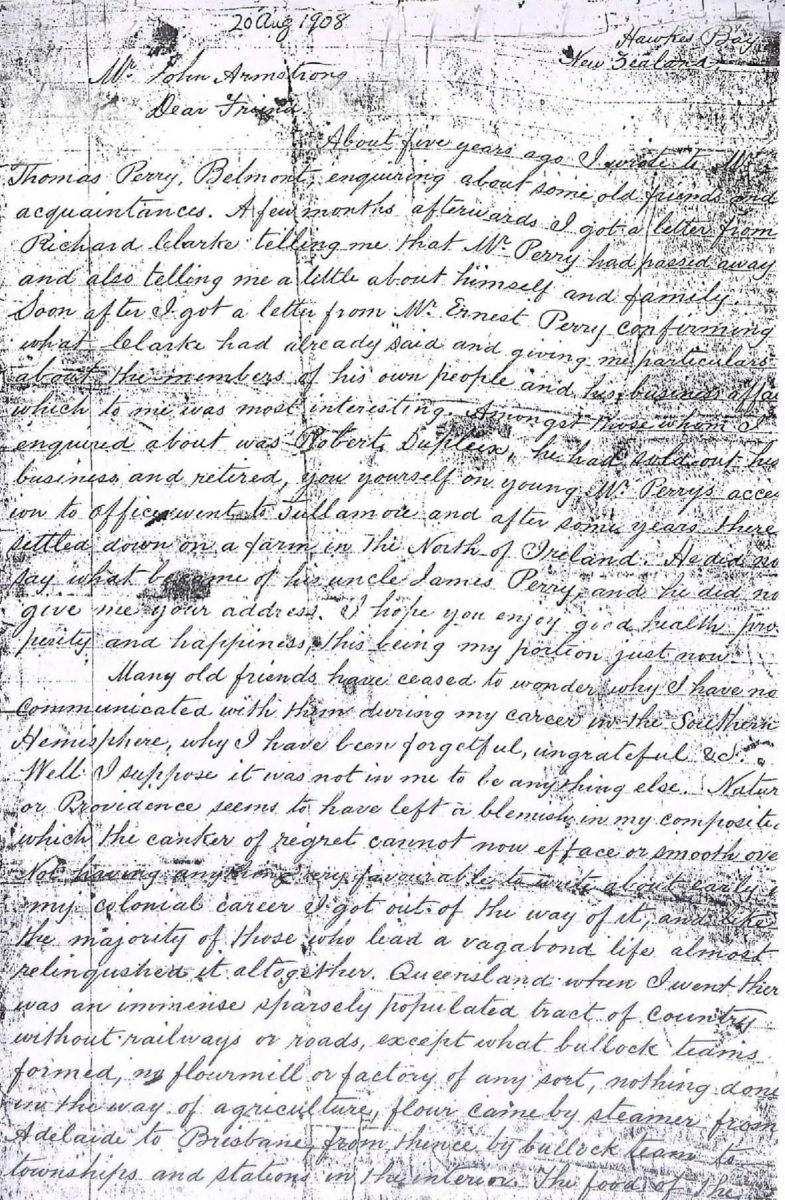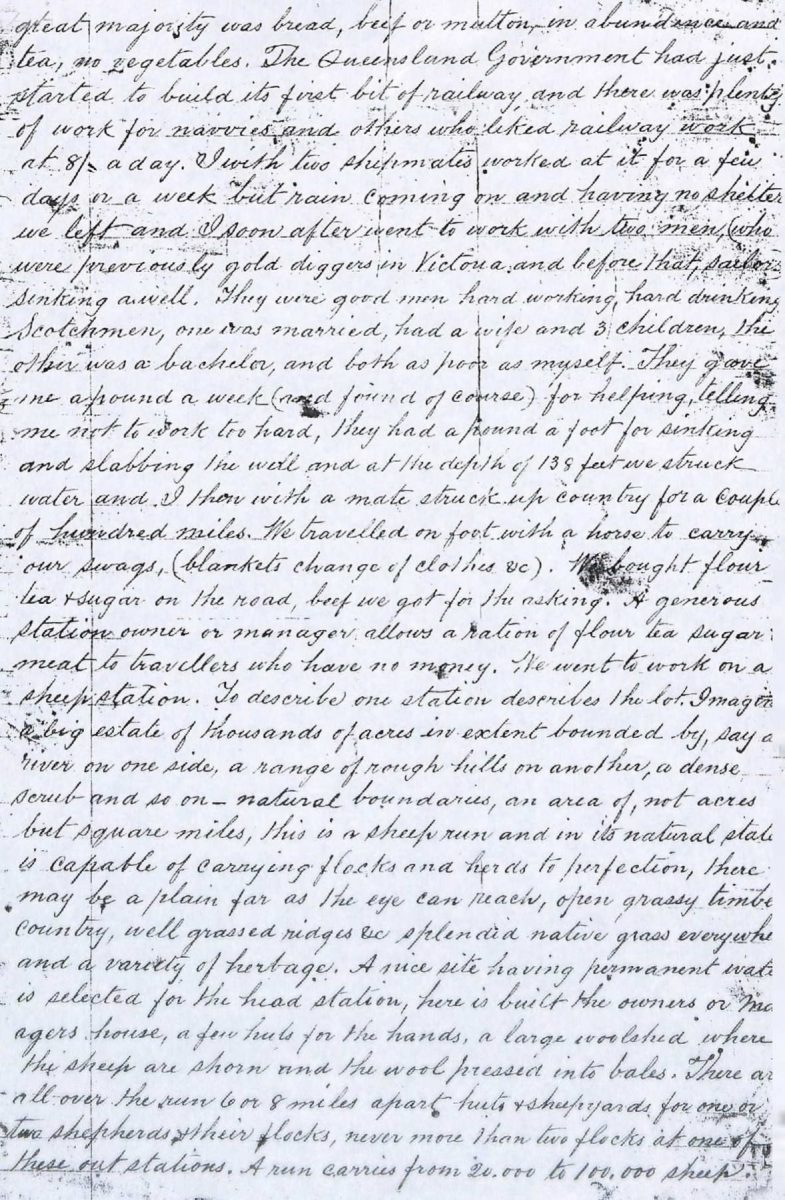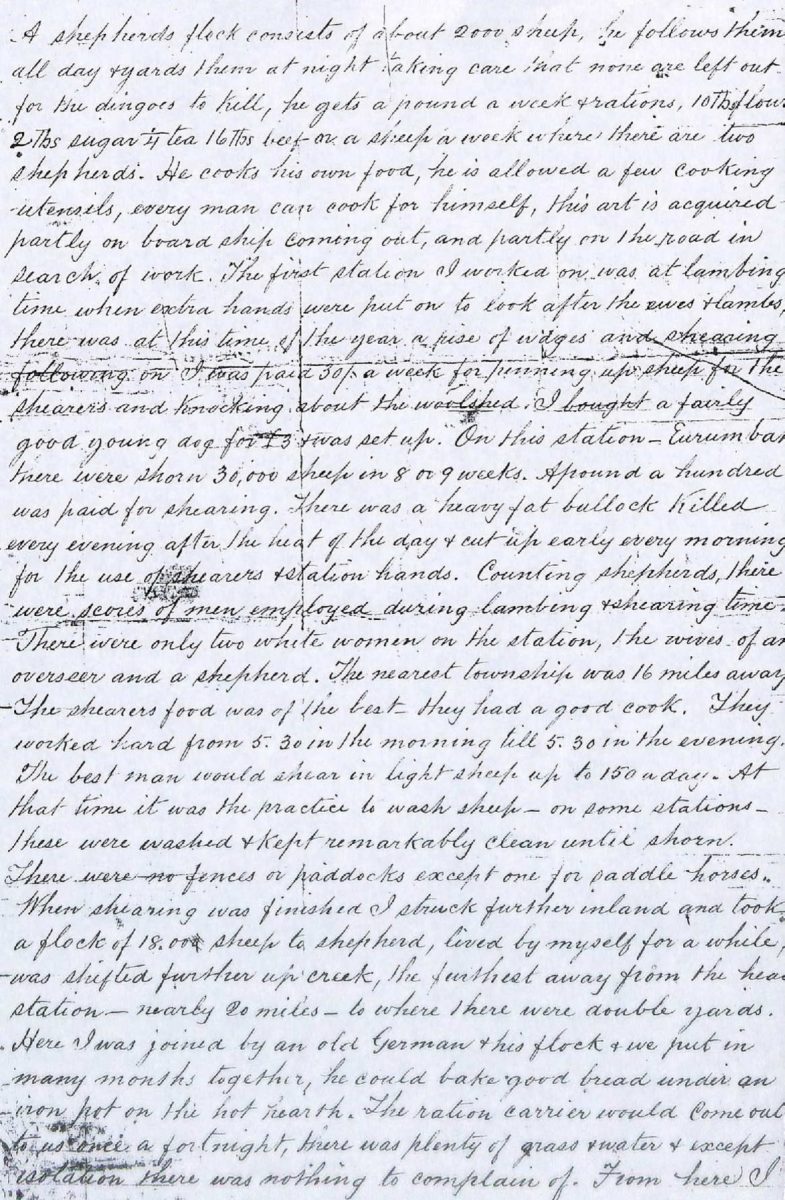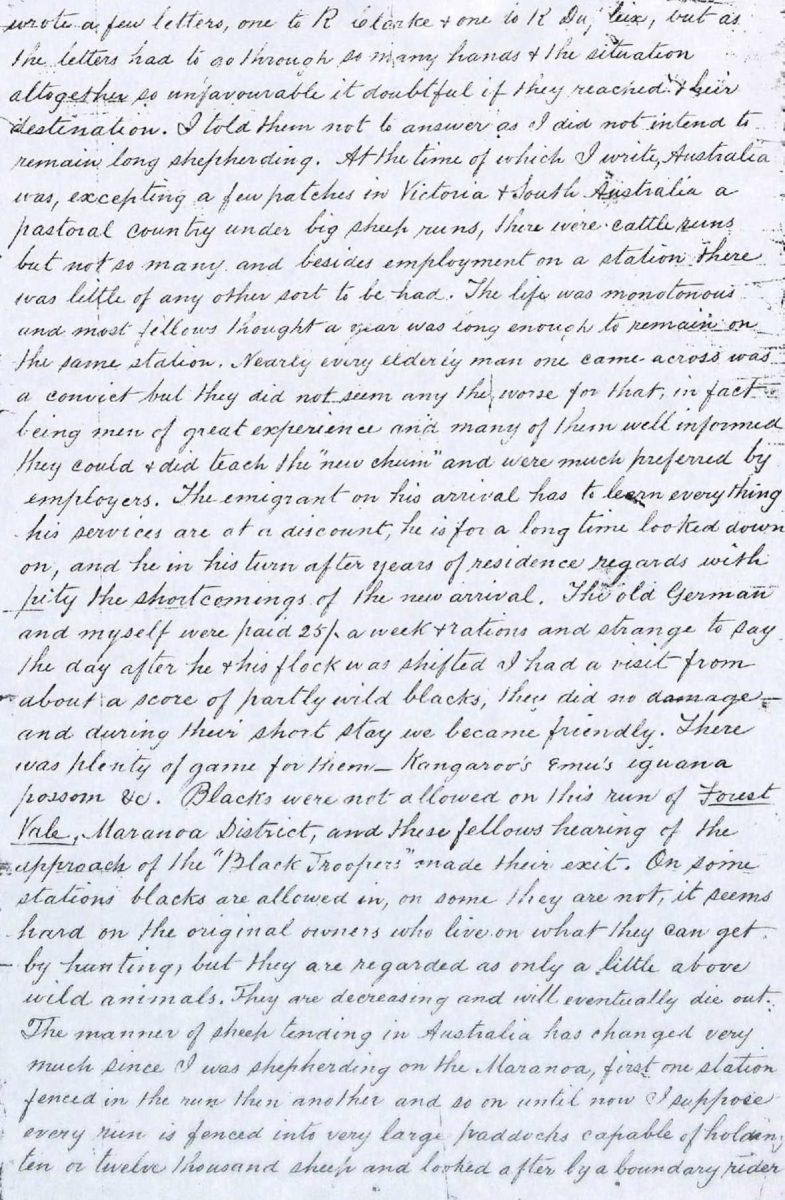- Home
- Collections
- RIDGE TK
- Various
- Letter 1908
Letter 1908
20 Aug 1908
Hawke’s Bay
New Zealand
Mr John Armstrong
Dear Friend
About five years ago I wrote to Mr Thomas Perry, Belmont, enquiring about some old friends and acquaintances. A few months afterwards I got a letter from Richard Clarke telling me that Mr Perry had passed away and also telling me a little about himself and family. Soon after I got a letter from Mr Ernest Perry confirming what Clarke had already said and giving me particulars about the members of his own people and his business affairs, which to me was most interesting. Amongst those whom I enquired about was Robert Dupleix, he had sold out his business and retired, you yourself on young Mr Perry’s accession to office went to Tullamore and after some years there settled down on a farm in the North of Ireland. He did not say what became of his uncle James Perry, and he did not give me your address. I hope you enjoy good health prosperity and happiness, this being my portion just now.
Many old friends have ceased to wonder why I have not communicated with them during my career in the Southern Hemisphere, why I have been forgetful, ungrateful etc. Well, I suppose it was not in me to be anything else. Nature or Providence seems to have left a blemish in my composition which the canker of regret cannot now efface or smooth over. Not having anything very favourable to write about early in my colonial career I got out of the way of it, and like the majority of those who lead a vagabond life almost relinquished it altogether. Queensland when I went there was an immense sparsely populated tract of country without railways or road, except what bullock teams formed, no flour mill or factory of any sort, nothing done in the way of agriculture, flour came by steamer from Adelaide to Brisbane from thence by bullock team to townships and stations in the interior. The food of the

Page 2
great majority was bread, beef or mutton, in abundance and tea, no vegetables. The Queensland Government had just started to build its first bit of railway and there was plenty of work for navvies, and others who liked railway work at 8/- a day. I with two shipmates worked at it for a few days or a week but rain coming on and having no shelter we left and I soon after went to work with two men (who were previously gold diggers in Victoria and before that sailors) sinking a well. They were good men hard working, hard drinking Scotchmen, one was married, had a wife and 3 children, the other was a bachelor and both as poor as myself. They gave me a pound a week (and found of course) for helping, telling me not to work too hard, they had a pound a foot for sinking and slabbing the well and at the depth of 138 feet we struck water and I then with a mate struck up country for a couple of hundred miles. We travelled on foot with a horse to carry our swags (blankets, change of clothes etc). We bought flour tea & sugar on the road, beef we got for the asking. A generous station owner or manager allows a ration of flour tea sugar & meat to travellers who have no money. We went to work on a sheep station. To describe one station describes the lot. Imagine a big estate of thousands of acres in extent bounded by, say a river on one side, a range of rough hills on another, a dense scrub and so on – natural boundaries, an area of, not acres but square miles, this is a sheep run and in its natural state is capable of carrying flocks and herds to perfection, there may be a plain far as the eye can reach, open grassy timber country, well grassed ridges etc splendid native grass everywhere and a variety of herbage. A nice site having permanent water is selected for the head station, here is built the owners or managers house, a few huts for the hands, a large woolshed where the sheep are shorn and the wool pressed into bales, There are all over the run 6 or 8 miles apart huts & sheep yards for one or two shepherds & their flocks, never more than two flocks at one of these out stations. A run carries from 20,000 to 100,000 sheep.

Page 3
A shepherds flock consists of about 2000 sheep, he follows them all day & yards them at night taking care that none are left out for the dingoes to kill, he gets a pound a week & rations, 10lbs flour, 2 lbs sugar 1/4 tea 16lbs beef or a sheep a week where there are two shepherds. He cooks his own food, he is allowed a few cooking utensils, every man can cook for himself, this art is acquired partly on board ship coming out, and partly on the road in search of work. The first station I worked on was at lambing time when extra hands were put on to look after the ewes & lambs, there was at this time of the year a rise of wages and shearing following on I was paid 30/- a week for penning up sheep for the shearers and knocking about the woolshed. I bought a fairly good young dog for £3 & was set up. On this station – Eurumbar [Eurombah?] – there were shorn 30,000 sheep in about 8 or 9 weeks. A pound a hundred was paid for shearing. There was a heavy fat bullock killed every evening after the heat of the day & cut up early every morning for the use of shearers & station hands. Counting shepherds, there were scores of men employed during lambing & shearing time. There were only two white women on the station, the wives of an overseer and a shepherd. The nearest township was 16 miles away. The shearers food was of the best – they had a good cook. They worked hard from 5.30 in the morning till 5.30 in the evening. The best man would shear in light sheep up to 150 a day. At that time it was the practice to wash sheep – on some stations – these were washed & kept remarkably clean until shorn. There were no fences or paddocks except one for saddle horses. When shearing was finished I struck further inland and took a flock of 1800 sheep to shepherd, lived by myself for a while, was shifted further up creek, the furthest away from the head station – nearly 20 miles – to where there were double yards. Here I was joined by an old German & his flock & we put in many months together, he could bake good bread under an iron pot on the hot hearth. The ration carrier would come out to us once a fortnight, there was plenty of grass & water & except isolation there was nothing to complain of. From here I

Page 4
wrote a few letters, one to R Clarke & one to R Dupleix, but as the letters had to go through so many hands & the situation altogether so unfavourable it doubtful if they reached their destination. I told them not to answer as I did not intend to remain long shepherding. At the time of which I write, Australia was, excepting a few patches in Victoria & South Australia, a pastoral country under big sheep runs, there were cattle runs but not so many and besides employment on a station there was little of any other sort to be had. The life was monotonous and most fellows thought a year was long enough to remain on the same station. Nearly every elderly man one came across was a convict but they did not seem any the worse for that, in fact being men of great experience and many of them well informed they could & did teach the “new chum” and were much preferred by employers. The emigrant on his arrival has to learn everything his services are at a discount, he is for a long time looked down on, and he in his turn after years of residence regards with pity the shortcomings of the new arrival. The old German and myself were paid 25/- a week & rations and strange to say the day after he & his flock was shifted I had a visit from about a score of partly wild blacks, they did no damage and during their short stay we became friendly. There was plenty of game for them – Kangaroo’s emu’s iguana possom [possum] etc. Blacks were not allowed on this run of Forest Vale, Maranoa District, and these fellows hearing of the approach of the “Black Troopers” made their exit. On some stations blacks are allowed in, on some they are not, it seems hard on the original owners who live on what they can get by hunting, but they are regarded as only a little above wild animals. They are decreasing and will eventually die out.
The manner of sheep tending in Australia has changed very much since I was shepherding on the Maranoa, first one station fenced in the run then another and so on until now I suppose every run is fenced into very large paddocks capable of holding ten or twelve thousand sheep and looked after by a boundary rider.

Page 5
Dingoes (wild dogs) and eagle hawks have been got rid of long ago by means of poison. I have seen mobs of wild horses run in for the purpose of being converted into bates [?] to be carried out for miles and hung up about the fences. The mode of travelling has also changed in places, one or two railways now run into the interior and I would not be surprised to hear of a flourmill or two at work in Towomba [Toowoomba] or Ipswich. After shearing time on Forest Vale I gave up my flock and there being 6000 fat sheep to go to Maryborough (on the coast between Brisbane and Port Makay [Mackay]) to be boiled down, the fate of all fat sheep in those days, I with two others undertook the job. There was an overseer who rode ahead and gave notice, counted the sheep occasionally, helped us to cross rivers etc. There was a married couple with two horses and dray to carry swags & provisions, the man pitched tents, killed a sheep as required etc, the woman cooked, we had 30/- a week and an easy time, the sheep were cut into three mobs every morning & put together at night & we watched in our turn. The feed was scarce for the first week but rain having fallen there was soon abundance of grass until we reached Maryborough after being four months on the road. From here I sent my mother £20. I afterwards sent other sums and these are the only bright specks that I can look back to with any little satisfaction. After the delivery of the sheep, I took steamer for Rockhampton a town further north, tried new diggings with a mate who turned out to be a fraud & drunkard, did no good, fooled about for years losing valuable time & money in hotels, boarding houses & steamers, always hearing about a better district that the one I was in, whenever writing home telling them not to answer as I did not know where my next address would be. About 1869 or 70 I left a digging in the north of Queensland with a couple of horses & little else in search of a job. I fell in with a mob of 22,000 sheep which were a week or so on the road. They belonged to a Mr Anderson who had failed, he lost station stock & everything, good buildings, iron roofs, not common then, the sheep were on the road for sale after being shorn. Men were not scarce, many hard up ones coming away from the diggings, wages was only a pound a week. There was the boss & his wife

Page 6
with their two horses & express, the overseer, a Mr Wilson, whose father was a Church of England clergyman in Kilbeggan Co. Westmeath, a black fellow, his gin and ten or eleven shepherds & the cook. My job or jobs were to keep the sheep on the camp whilst the men were having tea or breakfast, help to cut them into 2,000 mobs (about) go ahead & give notice, do the killing, drive the horse team from camp to camp & pitch tents when necessary which seldom happened, the men preferring to sleep around the fire. I had my own tent. There were a number of horses to be hobbled at each new camp. There is half a mile on each side of the road allowed by law for the use of travelling stock, often a great deal more is taken, and six miles a day is the stage, but this mostly depends on where there is water. During the first part of our journey the weak sheep dropped out and were left behind in scores along the track a gift to native dogs. We went over all sorts of country, across plains & over ranges, through rivers, over waterless tracts, once over a stretch of 70 miles without water, men & animals suffered, it is a thirsty country for man & beast. Sometimes when passing near a township – this sometimes consists of a hotel, a store or two, blacksmiths shop and a few other buildings – one of the hands would go on the spree & drop out, or we would pick up a man just off the burst & incapable of doing his work, a mob of sheep would be dropped or a man & his flock would get lost, and then the black fellow & myself would have to go to work tracking & perhaps after a day or so find him miles off the track. After we were on the road six or eight months the sheep were bought by a Mr Guiness [Guinness] & partner, I was told this Guiness was a nephew to the Dublin brewer. The price was I think seven shillings a head. We took them into New South Wales and they were shorn on Jandra Station – one of Guiness’s – on the Darling river six miles below the town of Bourke, after being twelve months on the road. I had charge of them here while being shorn, after which we took them to some back country, which we reached in a month, to be fattened for the Melbourne market. It would be too tedious to retail how we crossed them on a temporary bridge over the Darling or the tremendous rush they made when approaching water when nearly across the 70 mile waterless stretch. After all our ups & downs we

Page 7
delivered 20,000 in good condition, out of the original number which was considered satisfactory. Out of all those who started with the sheep the first week I was the only one who arrived at the journey end. I rode back to Queensland, fell in with another mob bound for N.S.W. and after this lot was delivered I bid good bye to Qsland [Queensland] for good. The conditions of living in N.S.W. was much better than in Queensland, there was no weighing out of rations, potatoes and vegetables were obtainable and sometimes milk & butter. I was doing nicely on a big station and meant to take up land and settle down, but the Palmer diggings broke out in the north of Queensland and my mate a valued chum & an old digger had the gold fever bad, we decided to go. I sold my two horses saddles & bridles cheap in order to raise all the cash I could, but before we could put our plan into execution by some lucky fluke I got a letter from my mother to say she & my two sisters were about to come to New Zealand and requesting me to meet them there which I did. In 1873 I sailed from Newcastle N.S.W. in the ship Wellington, a collier. Being short of sailors I worked my passage, she turned out to be leaky, but we kept her afloat until we reached the Wellington wharf, here she was caulked and I may add that in her next trip she was wrecked in Cooks Strait and two of my sailor acquaintances drowned. We arrived on the 3rd of October 1873 and I felt the cold very much after leaving the hot climate, at first I did not like the country, I felt cramped, not enough room to roam about, the land was all freehold, I could not select a square mile of country at a pound an acre on deferred payments as I could in Australia (The squatters run there is not freehold, it is reserved for future settlement, the occupier paying a trifle yearly for the use of it.) But the climate was cool, a regular rainfall, water good & abundant rivers & creeks ran all the year round, not at flood-time only as in Australia. English grasses grew well, you could cultivate with the certainty of getting a crop, there were great inducements for settling down, there was plenty down, the people had a good healthy colour and wore black clothes, there was plenty of work & good wages. I went shearing afterwards splitting fencing posts if one has to work at all this sort is the most payable. There is not

Page 8
much demand for clerks and they are not too well paid. I went into a small business with a partner who turned out to be a useless drunkard, I lost time & money over him ere we parted. I had a look at Taranaki, a Province on the west coast of this Island, it is chiefly under dairy farms & I may here say that now there are on some farms from 100 to 150 cows, the milking done in some cases by machines. Mr mother & sisters came out in 1874 and we went or came to Hawke’s Bay, where my sisters got married & my mother lived for 20 years & was 84 years when she died. In 1880 I went to the South Island. Octago [Otago] is peopled chiefly by Scotch settlers, is a great agricultural as well as pastoral province, Canterbury is also noted for big crops & good sheep. I came back to Hawke’s Bay & got a billet on a big station near the important township of Waipukurau. There was a great deal of fencing to be done and harvesting, I had charge of these things and there being a fair prospect I got married when nearly 40 years of age. I got £100 a year & partly found – a good house & garden, couple of horses & cows firewood etc. I could go shearing on the station if I wished & make another 30 or 40. Here I remained for about 10 years, bought the place on which I now live, which was part bush & part second hand land for which I paid […] per acre, the same sort of land now fetches £16 owing to proximity to dairy factories & better prices for produce. Sixteen years ago I left Waipukurau for here with a wife, a boy & girl, these latter are now over 21 years, we have a younger girl aged 11. They are healthy & strong & like myself never had any sickness. I got a nine roomed house put up paying carpenters 11/- a day. Woolshed & other buildings I put up myself. Our farm of 300 acres is well situated half a mile from township & factory (cheese & butter), 3½ miles from railway station. We winter 700 sheep & keep 14 milkers & other cattle & some horses. We do most of our own work. When I wrote to Mr Perry I also sent a letter to R. Dupleix but too late he did not answer, and why should he! I could hardly expect it.
For a long time after I left Australia I had a hankering after the roaming half savage life. I have long since become resigned & tamed down. I am well enough off. I have no mortgage or rent to pay. We are having an early spring & things look promising. I must now end this tedious letter, and remain your well wisher to the end.
Saml Brabazon

Non-commercial use

This work is licensed under a Attribution-NonCommercial 3.0 New Zealand (CC BY-NC 3.0 NZ).
Commercial Use
Please contact us for information about using this material commercially.Can you help?
The Hawke's Bay Knowledge Bank relies on donations to make this material available. Please consider making a donation towards preserving our local history.
Visit our donations page for more information.
Subjects
Format of the original
Photocopy of handwritten letterDate published
20 August 1908Creator / Author
People
- John Armstrong
- Richard Clark
- Robert Dupleix
- Ernest Perry
- James Perry
- Thomas Perry










Do you know something about this record?
Please note we cannot verify the accuracy of any information posted by the community.